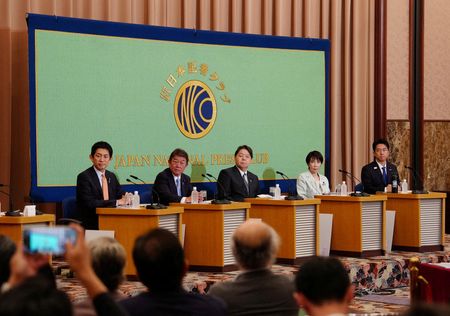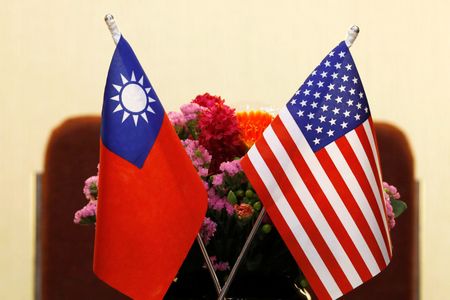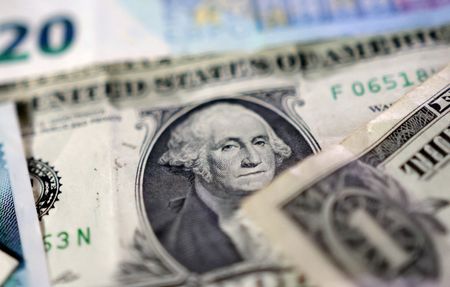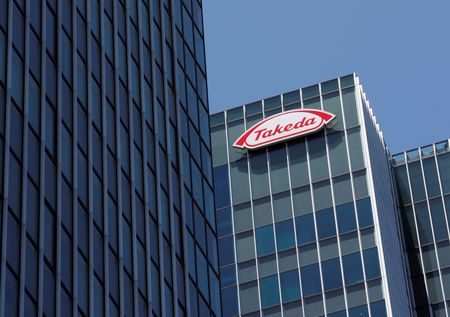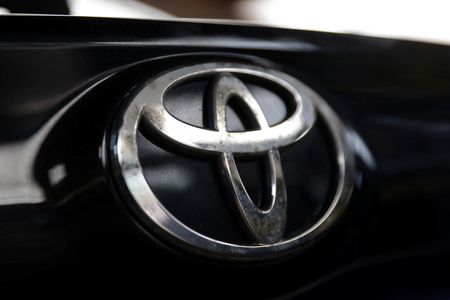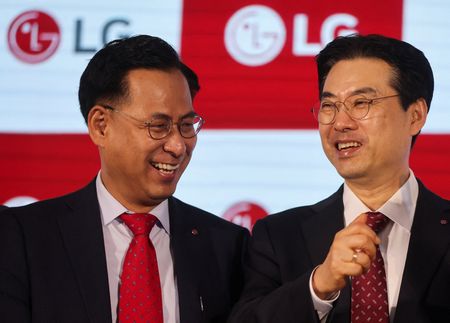By Makiko Yamazaki
TOKYO (Reuters) -Candidates vying to lead Japan’s ruling party are prioritising delivering relief to households hit by inflation as a key plank of their fiscal policy, proposing measures such as tax breaks while largely avoiding detailed discussion on how to fund them.
Persistent inflation has emerged as a major source of voter frustration, contributing to the loss of a parliamentary majority by the ruling Liberal Democratic Party (LDP) and its junior coalition partner Komeito.
The next LDP leader, and likely prime minister, faces the challenge of restoring public trust by offering tangible economic support without undermining fiscal discipline.
WHAT ARE CONTENDERS’ VIEWS ON CONSUMPTION TAX CUTS?
The five contenders have so far all kept their distance from calls made by major opposition parties for consumption tax cuts, including temporary exemptions on food items proposed by the largest opposition party, the Constitutional Democratic Party of Japan.
Even fiscal dove Sanae Takaichi, one of the frontrunners, has walked back her earlier proposal for food tax cuts, arguing that such measures would take time to implement at the retail level and fail to provide immediate relief.
Their reluctance to touch the consumption tax offers some reassurance to the finance ministry, which estimates that scrapping the tax on food alone would cost the government nearly 4 trillion yen ($27 billion) annually.
The consumption tax, currently set at 10% with a reduced 8% rate for food, accounts for nearly a third of Japan’s 78 trillion yen in general account tax revenue, playing a critical role in funding ballooning social security and healthcare costs in a rapidly aging society.
WHAT ECONOMIC MEASURES ARE BEING PROPOSED INSTEAD?
With the new LDP leader widely expected to seek a coalition with a major opposition group to regain a parliamentary majority, some concessions on fiscal expansion, advocated by most opposition parties, appear inevitable.
Rather than backing consumption tax cuts, the five leadership contenders have pledged to abolish a provisional gasoline tax, a move already agreed upon between the ruling coalition and major opposition parties.
The additional gasoline levy, introduced in the 1970s to fund road construction and maintenance, adds 25.1 yen per litre to the base gasoline tax of 28.7 yen. Its removal would result in an estimated revenue loss of around 1 trillion yen annually.
The candidates have also proposed various income tax reforms aimed at boosting take-home pay for working households, which are increasingly burdened by rising social welfare and healthcare costs due to persistent inflation.
Shinjiro Koizumi, another frontrunner, has proposed raising the threshold at which individuals become subject to income tax in line with rising wages and inflation, similar to what the opposition Democratic Party for the People has called for.
HOW WILL THOSE MEASURES BE FUNDED?
Details on how to fund the proposed economic measures remain scarce in the leadership race debate.
All candidates have pointed to increased tax revenues, driven by inflation and record-high corporate earnings in recent years, as a potential source of funding.
Only Sanae Takaichi has explicitly stated her willingness to issue additional government bonds, if necessary, to finance immediate relief measures aimed at cushioning the impact of inflation.
Japan has been saddled with the industrial world’s heaviest debt at more than twice the size of its economy. But inflation in recent years has boosted nominal gross domestic product, steadily lowering the debt-to-GDP ratio – a trend viewed positively by credit rating agencies.
($1 = 147.8900 yen)
(Reporting by Makiko YamazakiEditing by Shri Navaratnam)

